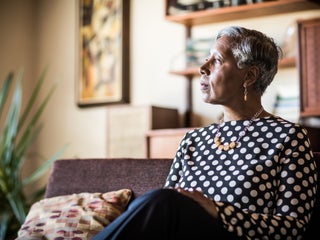Summary
The To Her Credit series offers targeted advice about personal finance based on unique challenges faced by women. It is authored by women with different financial backgrounds, dedicated to encouraging empowerment through financial literacy.
The content on this page is accurate as of the posting date; however, some of our partner offers may have expired. Please review our list of best credit cards, or use our CardMatch™ tool to find cards matched to your needs.
When it comes to managing your finances – whether it be signing up for a credit card, investing, applying for a loan or planning for retirement – it is of paramount importance to be knowledgeable and empowered. Unfortunately, for many women, there are often societal and personal barriers to overcome in order to thrive financially. The truth is, women face unique financial challenges and require unique financial advice.
According to Angela Ribuffo, president and financial advisor at Raion Financial Strategies and former president of Women in Insurance and Financial Services, it’s important to provide financial advice tailored towards women, as we are often at a disadvantage when compared to the lessons given to men.
The challenges
Despite having an edge on men in some areas of personal finance, women often have more barriers to overcome in order to be financially successful. Everyday challenges affect women’s financial success, whether we realize it or not.
Left out of the money conversation
It’s true – for a long time in American society, men were the primary breadwinners. Women weren’t taught anything about finance, because it wasn’t viewed as their job. So financial education for women was limited, even in their own homes. Unfortunately, this lack of education hasn’t caught up to modern realities.
Ribuffo describes this problem as extending to financial advisers, who often don’t loop women into the conversation. She describes the beginning of her financial adviser journey as a struggle to get the information she needed.
“Honestly, almost all of [the advisors I worked with] were men, so that was really difficult for me. Because I know what it feels like for them to not explain something, or not talk to me but talk at me,” says Ribuffo.
At a disadvantage to start
Statistically, women also tend to take harder hits in financial trouble. Their credit scores are hurt worse in a divorce, they suffer more stress over money troubles and have higher average credit card interest rates.
Unique financial needs
While it is easy to find personalized financial tips based on your income, debt struggles or career, the specific needs of women are often overlooked. By working as a financial adviser for women, Ribuffo has identified crucial gaps in financial education. For example, she stresses the need for an extended care plan with all of her single female clients.
“I want to talk about emergency savings and why that’s important. I want to talk about the fact that – especially if they’re single – I want them to have some kind of extended care plan,” she urged. “Statistically, single women are more likely than not to be put in a position of having to go on Medicaid for long-term care assistance because they don’t have anybody. They don’t necessarily have the finances to have control, so it’s important that they know that early and start to plan for that early.”
Lack of representation in financial services
Finance is a male-dominated industry; only 32% of financial advisors are women. This makes it difficult for financial advisers and other professionals to understand the unique needs of women.
“People like to do business with people who look like them – who can relate to them – and women are really good at relationship building. We need more women to be able to have conversations from a kitchen table perspective, where women are not going to be put off by having very frank conversations about whatever it is,” says Ribuffo.
Jean Chatzky, financial editor of NBC’s Today Show and CEO of HerMoney, has noticed a similar problem. She started her website to present financial advice to women in a new way – without the lingo you typically hear from a financial adviser.
“We need to explain [personal finance] in a way that’s understandable and reassuring, because otherwise the women that we are talking to will not be able to act on it. It will feel like there’s a barrier between what you’re learning and what you have to do,” she says.
Hesitance to admit ignorance
While we live in a world where women must constantly prove they are just as intelligent and capable as their male counterparts, it is important to find a balance between proving your worth and not missing out on learning things you need to know. Chatzky notices that many women are scared to be wrong, even when the question has no clear answer.
“I think there is something about being a woman that makes us want to know the answers to every question before we ask them. And it makes us want to know that those answers are correct. And in the world of money there are some things that have correct answers, but there are a lot that do not.”
According to Ribuffo, female clients are often worried about seeming ignorant to their adviser.
“I told my women clients all the time – there are no stupid questions. My hope is that the more you come in, the more questions you ask, the more comfortable you’ll be,” she says.
Plus, having that initial conversation about gaps in your financial knowledge sets women up to succeed in the future. Ribuffo notices “once they’re comfortable in that space, they could probably go anywhere. Because now they know what they don’t know.”
See related: How to combat 5 common female financial fears
The successes
Despite certain pitfalls, there are plenty of financial decisions women are already better at making. We are more focused on cutting credit card debt and willing to cut spending for the sake of boosting our savings accounts.
Women are also more likely to inherently understand what it takes to improve their credit score. When it comes to managing credit cards, women tend to use them a little more smartly than their male counterparts.
The need for targeted advice
The truth is, financial advice needs to be different for men and women. Women approach finance differently, because they have been told to their whole lives. Plus, women live longer on average, tend to spend less time in the workplace, are paid less than men and spend their money differently.
According to Ribuffo, “For the most part, women want to be financially stable and want to be financially fit. So if they find someone who’s willing to work with them, they tend to be successful.”
It is clear that with the right guidance, success in finance is achievable. As Ribuffo says “I think financial literacy is empowerment.”
More to come
Based on these unique challenges, we will continue to offer targeted financial advice by women, for women. If you are ready to take charge of your personal finances, subscribe to our weekly newsletter so you don’t miss out.
Editorial Disclaimer
The editorial content on this page is based solely on the objective assessment of our writers and is not driven by advertising dollars. It has not been provided or commissioned by the credit card issuers. However, we may receive compensation when you click on links to products from our partners.



